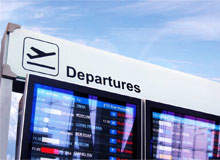
Future Airport: How do you see route development being affected by high oil prices and the feared economic downturn?
Rigas Doganis: The airline industry and airports are going to go through a difficult period if oil prices stay at the present level, or even if they drop to about $100 a barrel, which is still a significant increase. The industry is being hit from two sides. Firstly, the high oil price means airline costs are going up.
Secondly, the economic crisis in the US, now spreading to Europe, means demand is likely to decline or grow more slowly. So it’s a double whammy. Costs have gone up dramatically and demand is slowing down. The effect has yet to be fully felt. Over the winter, I think we’ll see a significant reduction in airline capacity, particularly on short-haul flights.
FA: And, of course, airports will be affected by these changes. How badly, though?
RD: A lot of regional airports will be affected by airlines reducing frequencies or pulling out altogether. In mid-July, for example, Ryanair said it would temporarily close bases at seven airports in Europe and cut back on its number of flights from Stansted airport this winter as part of a cost-reducing programme. Its decision was to halt operations for more than a month at Basel, Budapest, Krakow, Palma, Rzeszow, Salzburg and Valencia. Ryanair also plans to substantially cut capacity at Stansted for the winter. It decided to cut the number of aircraft based at Stansted from 36 to 28.
The definition of ‘base’ for a company like Ryanair is that the carrier has up to three aircraft there. If they cut those bases, they won’t have aircraft there, but they may continue to run flights to the location. The smaller regional airports will have a tough time in Europe and, to a lesser extent, in Asia. Low cost and legacy carriers will reduce or cut a lot of short haul operations.
How well do you really know your competitors?
Access the most comprehensive Company Profiles on the market, powered by GlobalData. Save hours of research. Gain competitive edge.

Thank you!
Your download email will arrive shortly
Not ready to buy yet? Download a free sample
We are confident about the unique quality of our Company Profiles. However, we want you to make the most beneficial decision for your business, so we offer a free sample that you can download by submitting the below form
By GlobalDataFA: Would you say that airports have little choice but to find a way of accommodating the changing economic reality faced by carriers?
RD: Ryanair says that the British Airport Authority (BAA), which owns and operates Stansted, had increased charges by 15% to July 2008, on top of a 100% increase the previous year.
Smaller airports where a particular carrier has a significant share of the flights will be under a lot of pressure to reduce landing fees and other changes. For example, if Ryanair is cutting Krakow, it’ll run fewer flights to the location or it might go to the airport and suggest that it cuts landing fees on the understanding that the carrier will continue flying.
The smart airports, particularly the second- and third-level airports, will think seriously about how to keep their biggest customers. This isn’t going to be a problem for the likes of Frankfurt or Heathrow, but it may be difficult for Valencia or Salzburg. In Asia, particularly South-East Asia and India, we’ve seen a boom in low-cost carriers. But they haven’t made a profit. It’s inevitable that some will collapse or there will be mergers. In the process, a lot of frequencies will be cut.
FA: How quickly do you think the industry as a whole is likely to recover? Is the overall picture much brighter from a longer-term perspective?
RD: Some observers may believe our present situation represents a cyclical downturn, but this time it’s more serious. In the past each downturn was followed by four good years. This cyclical downturn has come after just a couple of good years, those being 2005, 2006 and part of 2007. There haven’t been enough good years since the previous downturn for airlines to sort themselves out.
Naturally, where economies are growing and income levels are increasing, demand for air travel and new routes will continue to intensify. However, airlines may still lose money because of the higher oil prices. In the years ahead we’ll see a lot of instability, with collapses, mergers, acquisitions, and uncertainty for airports as to whether their customers will be there in five years. In 2001-02 airports including Zurich and Brussels suffered dramatic drops when their airlines virtually collapsed.







